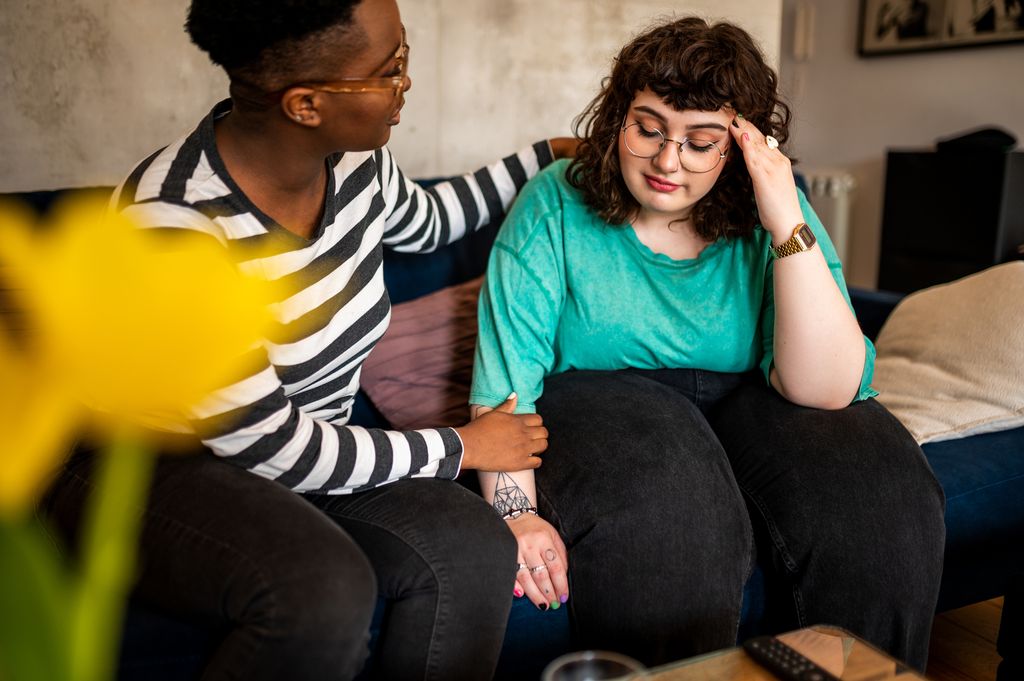My best friend and I have known each other since we were born. We went through school, college and university together. She knows me inside out and has been there through everything, so why don't I feel comfortable with her knowing I'm in therapy?
Over the years, conversations around mental health have opened up, largely in part thanks to celebrities and people in the public eye being open about depression and anxiety. I feel more comfortable than ever talking about my own mental health, but there's still a stigma for me when it comes to telling my oldest friends that I'm in therapy. I spoke to therapists about why this taboo still exists, and what we can do to feel more comfortable talking to our friends and family about our mental health.
Why is mental health still a taboo?
"Things are taboo because of the stories we construct around them," explains BACP-accredited therapist Daniel Mills-Da'Bell.
"We tell ourselves we shouldn’t talk about certain issues - that they’re bad or that they cause too much pain and discomfort to acknowledge. So, we keep certain issues in the dark to protect ourselves."
Fellow BACP accredited counsellor and coach, Nicola Vanlint agrees, adding: "Mental health challenges can be daunting, and the fear of judgment often prevents people from speaking out."
Jodie Cariss, founder and CEO of Self Space, the world's first on-demand mental health service on the high street adds: "If none of your friends are in therapy, being the first to share that you’re seeking help can stir up feelings of embarrassment - nobody wants to be seen as weak. It’s this rhetoric that makes me want to change the narrative around therapy and mental health support. It’s not for the weak - it is one of the most powerful things a human can do for themselves."
My best friend knows I struggled with anxiety throughout our teen years, but I don't think she ever grasped the impact it had on my life in adulthood, in the way that the friends I made as an adult did, which means I've felt ashamed talking about it with her, let alone sharing that I've sought professional health.
READ: I’ve had depression for 10 years - here’s what’s actually helped me
Though the stigma around mental health has been diluted and lessened over time, it has not been completely removed, Daniel points out. "We still see complex and often judgmental narratives reinforced through the media and via other public platforms."
Daniel adds that as well as cultural narratives preventing us from speaking out, finding the right language to convey our feelings can sometimes be a challenge.
"Ultimately being able to let somebody know that we’re ‘not ok’, or that we are struggling, is really important. Lots of people find that being able to do this with those they trust is much more of a positive and helpful experience than they had expected," he says.
READ: I tried therapy despite thinking I didn't need it – and it was eye-opening
Why we need to talk about mental health with our friends
1. Talking eases isolation
"When we share our mental health struggles and are met with empathy, it provides an outlet for expressing feelings and reduces the weight of isolation," says BACP registered therapist, Charlotte Braithwaite. "Open conversations allow the humanisation of mental health challenges, dispelling misconceptions and de-stigmatising shame."
Nicola agrees, adding: "Feeling less alone is a crucial aspect of open conversations about mental health. Many individuals grappling with mental health issues often believe they are isolated in their struggles.
READ: Tips for loneliness: try this expert-approved 5-minute hack next time you're feeling lonely
"When people speak openly about their experiences, it creates a sense of solidarity. Recognising that others share similar challenges helps foster a community where individuals can support and uplift one another."
2. We can't get support without talking
"It’s not until we feel safe and comfortable enough to share our struggles that we can get the support and help we need- whether that’s from professionals or our friends and family," says Daniel.
READ: Have you got a winter mindset? Here's how it's impacting your mood
3. It can help others too
By being open about how we're feeling, we can help others. "We can all be guilty of nourishing the taboo of mental health, but the more light we shine on an issue, the more we can let it escape from the dark – which allows us to feel more comfortable and accepting so that we can share our feelings and experiences," Daniel says.
"This is the only way we can let people know that we are there with them, we see them, that there is no shame because we accept, and we validate their experiences. If we don’t talk about, or we don’t use straightforward language to describe our feelings, we give the taboo more power."
Nicola adds: "The more we discuss mental health openly, the more we contribute to a culture where seeking professional support is viewed as a proactive and positive step. This shift in perspective is crucial for breaking the cycle of silence that often exacerbates mental health challenges."
Reframing therapy
Reframing the narrative around therapy can help us feel more comfortable talking about it with our friends.
"In the past, going to therapy was seen as ‘having something wrong with you,' but we should think about it as proactive, and supporting us to be our best selves, giving us tools to use when we hit choppy waters, which we all will at some point," says Jodie.
"We need to reframe therapy as a superpower for achieving mental wellness - it’s not something to be ashamed of," continues Jodie. "Remember, therapy is not just something you reach for during points of crisis and you do not have to be unwell to be in therapy. It’s a proactive tool for looking after your mental health and you should celebrate it. Therapy is about equipping you with the tools to better your relationships and better deal with challenges when they come up."
How to be open about mental health
1. Start with small, specific details
"Beginning to talk about your mental health can feel overwhelming, so it can be helpful to start by sharing smaller, more manageable aspects of your experience," suggests Charlotte. "Don't worry about trying to 'figure it out' or explaining yourself, it can be very cathartic to simply talk out loud and be listened to.
"It takes enormous courage to seek support when we are struggling, and yet it is the first step towards not only helping ourselves but in building supportive communities around mental health."
READ: 5 life coach-approved ways to feel happier - without spending a penny
2. Take it slow
"When you are opening up, remember to take your time to express how you’re feeling – just try not to don’t rush it," says Daniel. "If there are things that make you feel more grounded and safer, lean into these. Maybe fiddling with a pen, or having a drink in your hand, speaking at a slower pace, and being mindful of your breathing may help.
"Remember you’re there to share and open up about your mental health: it’s the start of an experience and doesn’t have to be everything. Try not to put too much pressure on yourself to share everything and remember everything in one go - that might feel too overwhelming. And share only as much or little as you feel comfortable to."
3. Express your needs
"Clearly communicate what kind of support you are seeking," says Nicola. "Whether it's a listening ear, advice, or companionship, letting others know how they can help creates a foundation for a supportive relationship."
4. Don't be put off
If the conversation doesn't go as you'd hoped, please don't let this deter you from trying again in future.
"If the experience wasn’t ideal and felt scary, remember that this doesn’t mean it’s the blueprint for every future conversation," says Daniel. "There are lots of compassionate and kind people waiting to hear you, support you and be alongside you without any judgment. Don’t expect too much from one conversation, you’ve made an incredible start."
He adds that if you're talking to someone close to you and they don't understand, try to be gentle with them. "If you are given unhelpful responses, try not to react too impulsively to this. If you feel comfortable and safe to do so, let them know that this wasn’t a very helpful response because it felt like they’d not heard you, and maybe explicitly tell them you don’t need or expect them to fix this, and that you’re grateful not to be alone with this. "
READ: How can I stop relying on my friends for happiness? An expert's guide
5. Take care of yourself
"Remember, opening up about mental health is a personal journey, and there is no one-size-fits-all approach," says Nicola. "Each individual's experience is unique, and seeking support is a commendable step towards fostering mental well-being.
"Opening up about mental health can be emotionally draining. Prioritise self-care and recognise and celebrate the courage it takes to share your struggles."














